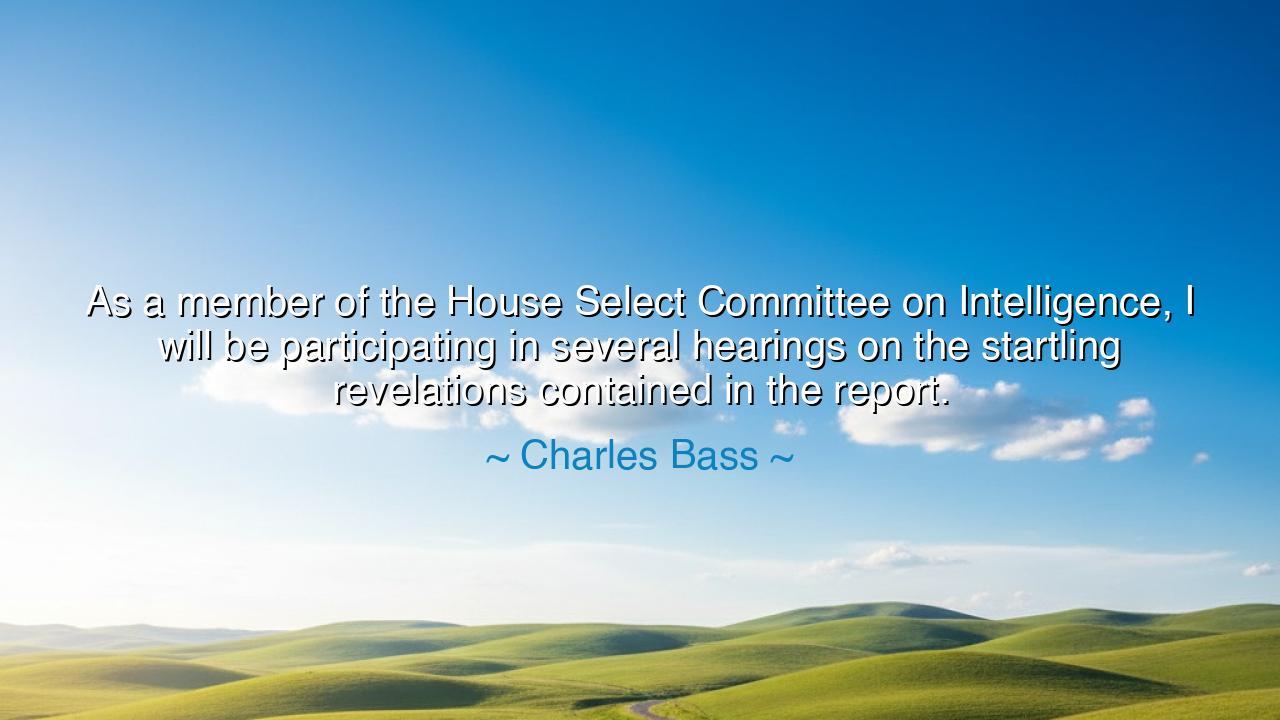
As a member of the House Select Committee on Intelligence, I will
As a member of the House Select Committee on Intelligence, I will be participating in several hearings on the startling revelations contained in the report.






In the darkness of secrecy, where the shadows of hidden truths and unspoken knowledge often linger, the role of a truth-bearer becomes paramount. Charles Bass’s words, “As a member of the House Select Committee on Intelligence, I will be participating in several hearings on the startling revelations contained in the report,” resonate with the ancient call to seek the truth, no matter how uncomfortable or dangerous it may be. The House Select Committee on Intelligence, tasked with overseeing matters of national security, holds within it a powerful responsibility: to uncover, reveal, and address the truths that might otherwise remain buried. Bass’s statement reflects the eternal duty of those in power to face difficult realities and act on the knowledge that is revealed, no matter the consequences.
In the ancient world, the seeking of truth was often fraught with peril. Socrates, that great philosopher of Athens, was sentenced to death for daring to question the established norms of his society. He believed that the search for knowledge and truth was the highest form of virtue, even if it meant defying the powerful and enduring the harshest of punishments. Socrates’s belief in the power of revelation—whether through questioning or through intellectual honesty—taught us that the pursuit of truth is not merely an intellectual exercise, but an act of courage. In the same way, Bass’s role on the committee is not just about reviewing facts; it is about facing revelations that might challenge the very foundations of society and the governance we uphold.
The Romans too, in their governance, understood the importance of uncovering hidden truths. Cicero, the great orator and statesman, used his position to uncover the secrets of corruption in the Roman Senate. He was not just a voice of dissent but a champion of integrity, believing that truth must be brought to light, even at the risk of political upheaval. Cicero’s speeches often called for transparency, and he understood that only through the courage to face the darkness could the light of justice be restored. Bass, by participating in the hearings, follows in this tradition: the role of truth-teller is not for the faint-hearted, but for those who understand the importance of integrity and accountability in the face of hidden knowledge.
History is rife with examples of the burden of revealing startling truths. One of the most profound moments of revelation in history came during the Watergate scandal in the 1970s. Woodward and Bernstein, two reporters, uncovered the secrets that lay at the heart of the scandal, revealing the abuses of power within the highest offices of the land. The revelations they brought to light, though initially met with resistance and denial, ultimately led to the resignation of President Nixon. Just as the intelligence hearings led by Bass might uncover uncomfortable facts, so too did those early revelations in the press. The truths unearthed by these journalists were startling and shocking, but their courage in pursuing them for the good of the nation made their work a cornerstone of the country’s democratic health.
Bass’s participation in the hearings, though a modern occurrence, is rooted in this same ancient duty: to reveal the truth, no matter how inconvenient, for the sake of the greater good. The revelations contained in the report may not be easy to face, but they are necessary to the functioning of any just society. Transparency in governance, accountability, and the willingness to confront uncomfortable truths are what separate free societies from authoritarian ones. It is in the unveiling of these truths that we ensure the integrity of our systems and safeguard the trust of the people. Bass’s role as a member of the committee places him in a long tradition of leaders who have stood up to ensure that justice is not compromised, even when faced with the harsh light of truth.
The lesson for us today is one of courage and honesty. In our personal lives, we too must face revelations that challenge our understanding of the world, whether in relationships, work, or society at large. How often do we turn away from uncomfortable truths, ignoring the knowledge that might disrupt our comfort? How often do we fail to confront the hidden corruption or inequities that exist in our communities? Bass’s role reminds us that to ignore the truth is to perpetuate ignorance and injustice. It is through the active revelation of truths—whether personal or political—that we bring about change, healing, and progress.
So, as we move forward, let us remember the importance of truth, as embodied by Bass and the many truth-seekers who have come before him. Whether we are called to question, to reveal, or to simply listen, let us honor the sacred duty of pursuing what is right, not what is easiest. In doing so, we fulfill the role of guardians of justice—not by maintaining the status quo, but by boldly confronting the realities that shape our lives and shaping a future built on the foundations of truth and integrity.






AAdministratorAdministrator
Welcome, honored guests. Please leave a comment, we will respond soon